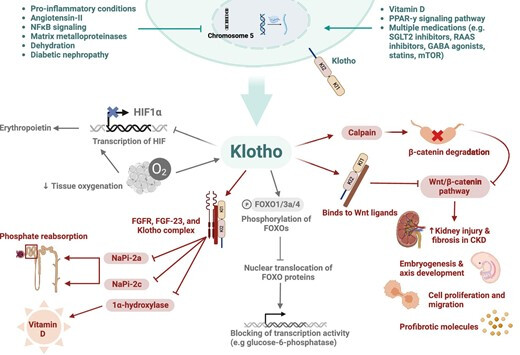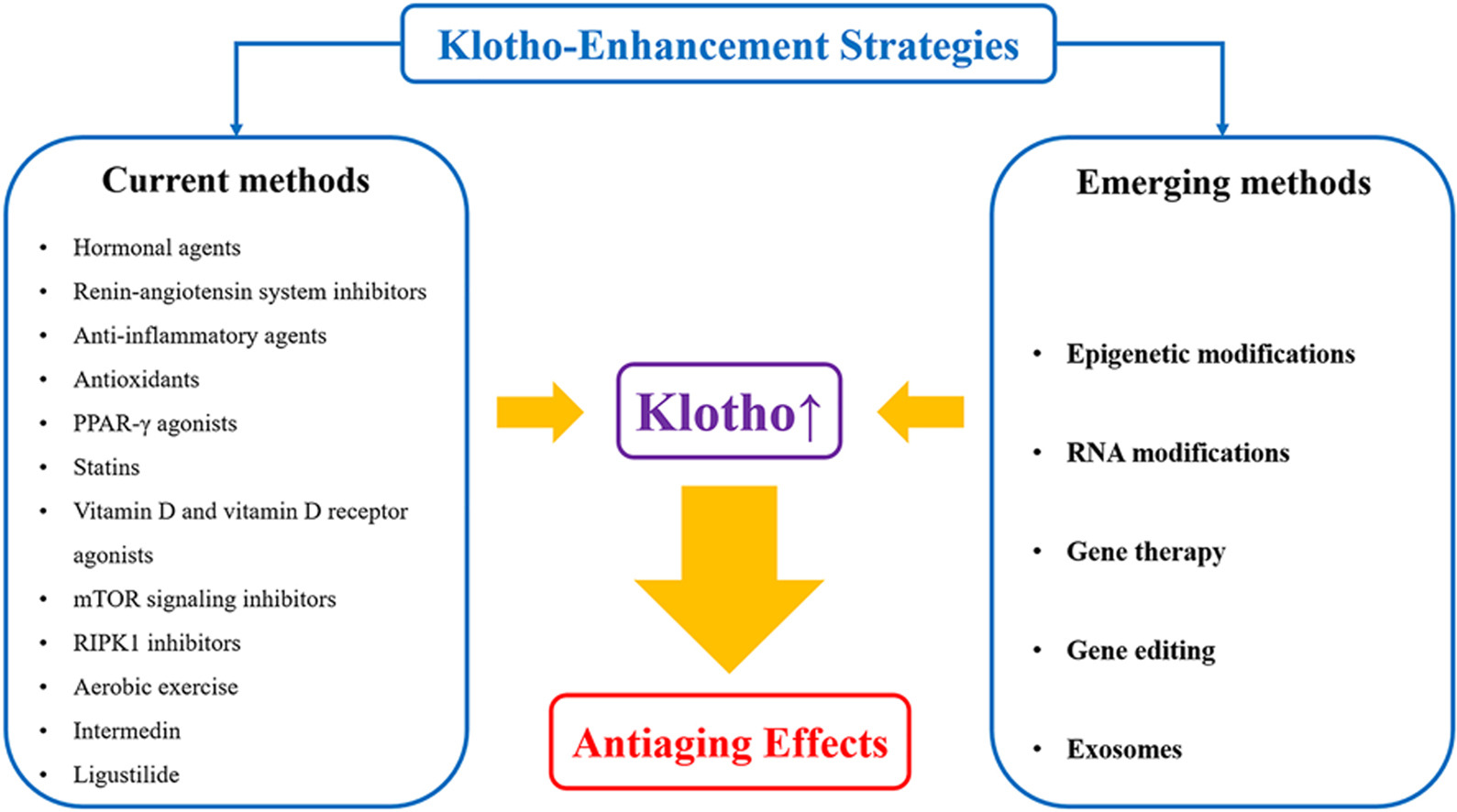Related Paper the article is based on:
In elderly individuals, aging can cause changes in the structure and function of one or more organs, increasing their susceptibility to various damage factors, especially the heart, kidney, brain and other important organs. Therefore, the incidence of cardiovascular disease, neurodegenerative diseases and chronic kidney disease in the elderly population is significantly higher than that in the general population. In our previous study, the hearts of aged mice did not express the antiaging protein Klotho (KL), but peripheral elevation of KL may significantly delay cardiac aging. The kidney and brain are the main organs that produce KL, but the effects and mechanism of peripheral KL supplementation on the kidney and hippocampus are still unclear. To study the effect and possible mechanism of KL against kidney and hippocampus aging, 60 male BALB/c mice were randomly divided into the Adult group, the KL group, the D-gal-induced Aged group, and the KL + Aged group. The results showed that KL increased anti-inflammatory M2a/M2c macrophages in the kidney and hippocampus of aging mice, significantly reduced tissue inflammation and oxidative stress, and improved organ function and aging status. More importantly, we demonstrate that despite the impermeable bloodbrain barrier in mice, peripherally administered KL surprisingly enhances M2-type microglia polarization, induces cognitive enhancement and reduces neuroinflammation. Cellular experimental results suggest that KL may play a role in delaying senescence by regulating the TLR4/Myd88/NF-κB signaling pathway to regulate macrophage polarization and reduce aging-related inflammation and oxidative stress.
Paper (behind paywall)
https://www.sciencedirect.com/science/article/abs/pii/S004081662300037X
This may be useful
Platelet factors are induced by longevity factor klotho and enhance cognition in young and aging mice
Platelet factors regulate wound healing and can signal from the blood to the brain1,2. However, whether platelet factors modulate cognition, a highly valued and central manifestation of brain function, is unknown. Here we show that systemic platelet factor 4 (PF4) permeates the brain and enhances cognition. We found that, in mice, peripheral administration of klotho, a longevity and cognition-enhancing protein3,4,5,6,7, increased the levels of multiple platelet factors in plasma, including PF4. A pharmacologic intervention that inhibits platelet activation blocked klotho-mediated cognitive enhancement, indicating that klotho may require platelets to enhance cognition. To directly test the effects of platelet factors on the brain, we treated mice with vehicle or systemic PF4. In young mice, PF4 enhanced synaptic plasticity and cognition. In old mice, PF4 decreased cognitive deficits and restored aging-induced increases of select factors associated with cognitive performance in the hippocampus. The effects of klotho on cognition were still present in mice lacking PF4, suggesting this platelet factor is sufficient to enhance cognition but not necessary for the effects of klotho—and that other unidentified factors probably contribute. Augmenting platelet factors, possible messengers of klotho, may enhance cognition in the young brain and decrease cognitive deficits in the aging brain.
The current and emerging Klotho-enhancement strategies
Klotho is well known as a gene with antiaging properties. It has membrane and soluble forms, providing a unique system that controls various metabolic processes essential to health and disease. Klotho deficiency has been revealed to be associated with various aging-related disorders. Based on its various known and unknown protective properties, upregulating the Klotho gene may be a possible therapeutic and/or preventive approach in aging-related complications. Some agents, such as hormonal compounds, renin-angiotensin system inhibitors, antioxidants, peroxisome proliferator-activated receptor gamma (PPAR-γ) agonists, statins, vitamin D receptor agonists, antioxidants, anti-inflammatory agents, mammalian target of rapamycin(mTOR) signaling inhibitors, and receptor-interacting serine/threonine-protein kinase 1 (RIPK1) inhibitors, can possibly lead to the upregulation and elevation of Klotho levels. Demethylation and deacetylation of the Klotho gene can also be considered other possible Klotho-enhancement methods. Some emerging techniques, such as RNAmodifications, gene therapy, gene editing, and exosome therapy, probably have the potential to be applied for increasing Klotho. In the present study, these current and emerging Klotho-enhancement strategies and their underlying mechanisms were comprehensively reviewed, which could highlight some potential avenues for future research.
Paywalled Paper:
https://www.sciencedirect.com/science/article/abs/pii/S0006291X23014511
BioViva on Klotho…
Beyond Limitless: Unveiling the Real NZT-48, Klotho Gene Therapy
In Limitless, the film’s protagonist is a struggling writer desperate for success. As luck would have it, he is introduced to an experimental drug that unlocks his full potential.
The film was a box office success, and it is easy to see why.
Nootropics, drugs, and various supplements for memory, focus, and mental agility have been used for millennia. The desire to elevate ourselves is universal, much like the quest for longevity–and, unsurprisingly, the two are intertwined.
Imagine a gene that could increase your IQ by 6, 9, or even 12 points — nearly a full standard deviation.
A way of doing this, while protecting our brains and prolonging healthy longevity, is not fiction or theory. NZT-48 from Limitless may have a real-life counterpart: a protein called Klotho. Klotho gene therapy could be a common preventative measure in the near future, one with genuinely life-enhancing benefits.
In 1997 Makoto Kuro-o and his colleagues reported that they had accidentally discovered a gene that encodes a protein that slows aging and extends the lifespan of mice. They named the protein ‘Klotho’ after the Greek goddess that ‘spins the thread of life’. During the past decade University of California San Francisco professor Dena Dubal has shown that Klotho can enhance learning and memory and protect neurons and synapses aging dysfunction and degeneration in mouse models of Alzheimer’s disease. Klotho production is increased by exercise and intermittent fasting. In this episode Dr. Dubal talks about her research on Klotho and the potential of Klotho as a treatment for cognitive impairment, Alzheimer’s disease, and other brain disorders…
A breakthrough in Alzheimer’s disease: the promising potential of klotho for brain health, cognitive decline, and as a therapeutic tool for Alzheimer’s disease | Dena Dubal, M.D., Ph.D.
There is a Facebook group “Klotho Antiaging” where people discuss using Klotho from Bucky Labs:
https: //www.facebook.com/share/kvHHS2T2jhwituBk/



